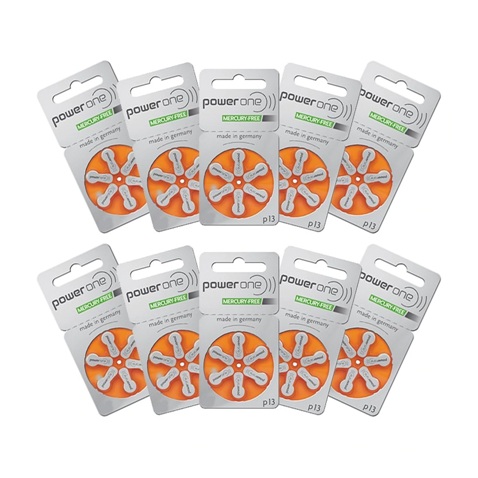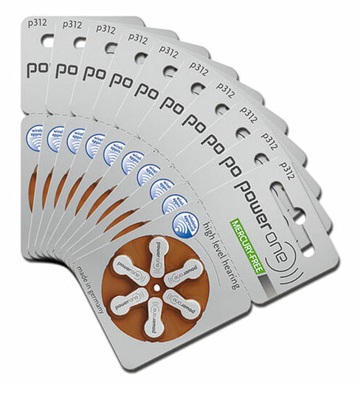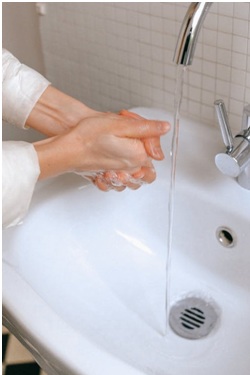Hacks for Size 13 Hearing Aid Batteries: Ensuring Viability and Lifespan
May 10th 2021

Hearing aid batteries, like other button batteries, come in a large range of sizes and shapes. It’s not easy telling all of those little batteries apart, so they’re labeled prominently. Even with the labels, it’s tough to tell them apart so they’re often color-coded.
For those of you looking for size 13 hearing aid batteries, they usually come with a little orange tab affixed to them. That little tab does two things; it helps you identify them at size 13s (although you should always check on the packaging) and it also helps to prevent air from contacting the battery.
Color-coding and sizing apart, you know why this tab matters? Because it keeps your batteries alive for longer. Many hearing aid batteries are air-powered, which means that air catalyzes a reaction in the battery’s cell that releases energy in the form of a flow of electrons. When you pull the tab off the back of the battery, that reaction occurs and won’t stop until the battery dies.
It’s a shame that batteries can be wasted like this, which is exactly the reason you should leave the tabs on your size 13 hearing aid batteries until you’re actually ready to use them. It will keep them alive longer. That same goes for other hearing aid batteries that use air as a catalyst to release energy.
It’s also only one tip. You can follow these other expert suggestions for storage, handling, and care of your hearing aids and batteries to help extend their usable lifespans.
1.Don’t remove the tab!
Whether or not you keep your size 13 hearing aid batteries in a battery caddy, don’t remove the tab until you’re actually ready to pop them into the device. The reason for this goes further than the obvious fact that you won’t easily be able to tell your batteries apart anymore once you remove the tab.
That tab does something else, which is, namely, to prevent air from accessing the battery’s internals. Many hearing aid batteries - the majority, in fact - are made up of a reactive metal solution (typically zinc) that oxidizes on contact with air. Until this metal solution contacts air, it is effectively stalled from reacting, which keeps the battery “alive.”
However, once the battery is exposed to air, the metal solution inside begins to oxidize, which releases energy. Once that happens, the battery’s power will slowly be draining whether or not the battery is installed in a hearing aid.
Unlike other batteries, these types of button batteries will begin to die as soon as you remove the tab. That gives you one more reason to leave the tab on in addition to the fact that it enables you to tell them apart more easily. Keep the tab in place and your batteries will last significantly longer. In fact, with the tab in place (and all other good practices for storage observed) hearing aid batteries can last for four years or perhaps even slightly longer.
2.Keep them sealed till ready to use
Keeping the tab in place on the backs of those size 13 hearing aid batteries is important because it protects them from the air and will help protect their lifespan, but it is far from the only “best practice” you can observe to help ensure that when you need them, they’re ready when you are. Considering how expensive hearing aid batteries are, and how important they are to the daily lives of those who rely on them, you should take stock of every pointer we’re going to offer in this article.
That includes keeping them stored in their packaging before you are actually ready to use them. This will, naturally, ensure that the protective tabs remain in place on the backs of the batteries but it will take their protection a step further.
The packaging that most hearing aid batteries come in is also instrumental in protecting the batteries within from air, but it can also help insulate them from fluctuations in temperature. The packaging they come in also has the potential to insulate the batteries within from changes in moisture which can result in corrosion or otherwise diminish the shelf life or subsequent practical lifespan of the batteries. Keep them sealed and keep them stored somewhere safe. That brings us to our next point.
3.Store them at room temperature (somewhere dry!)
Another thing you can do to help protect the lifespan of your hearing aid batteries is to store them somewhere stable and cool (or at room temperature) away from harsh fluctuations in temperature and humidity. Either of these things or both can have a damaging effect on the lifespan of hearing aid batteries.
Store them at room temperature or in a cool location (not cold) as this will help them last longer. You may have heard to keep them somewhere cold given the reasoning that the colder the air, the slower the reaction will occur. There is no appreciable difference here, and in reality, when you expose your hearing aid batteries to cold temperatures (such as in the fridge) there may be a higher level of moisture in the air.
Moisture is even worse for the lifespan of hearing aid batteries than high temperatures are, and moisture will cause corrosion in short order. This will not just shorten their lifespan; it will probably render them unusable.

The long and short of it is to keep your hearing aid batteries somewhere at room temperature or cool, that is as dry as possible.
4.When you do remove the tab, wait a couple of minutes before placing them in the hearing aids
So you’re ready to remove the tab and actually place one of those size 13 hearing aid batteries into one of your devices. You get ready with the batteries, peel off the tab, and pop the battery into the device in the blink of an eye. You’ve just secured the longest possible practical lifespan for those batteries because you exposed them to the air for a minimum of time before transitioning to the hearing aid, right?
It sounds foolproof in theory, but in practice, it’s actually not beneficial. It’s actually a good idea to take the tabs off of your batteries and then wait a few minutes (some would call it the five-minute rule) before placing the batteries in your hearing aids.
The reason for this is because air is required to activate the batteries and you can actually extend the lifespan of the batteries by as many as a few days by exposing them to the air before placing them in the device. It might make sense to limit the exposure to air, but once you’ve made the decision to use the batteries, give them a few minutes to “warm-up” before installing them.
5.Make sure your hands are clean before handling the batteries

Another good habit to get into is to make sure your hands are clean before you handle the batteries or before you remove the tabs to install them. You don’t need to go crazy with this; just engaging in proper hand-washing before you get ready to replace your batteries should be more than adequate.
The reason for this is because your hands naturally contain dirt, oils, and other residues, even when they appear to be very clean. Washing them before handling the batteries will remove these trace residues before you touch the batteries.
The grease and dirt that occur naturally on your hands can not only damage the hearing aid but may also adversely affect the lifespan of the batteries you handle. The batteries possess a delicate balance of chemicals in order to react with the air and provide energy; altering this by imparting oils can cut back on their useful lifespan.
6.Open the battery door at night or when you’re not using the hearing aids
Whenever you aren’t wearing your hearing aids or using them but have batteries installed, it’s generally a good idea for you to open the battery door. We can almost hear you thinking “That exposes them to air!’ against which we have cautioned you throughout this article so far, so allow us a defense.
Yes, it is not a good idea to expose hearing aid batteries to air, generally, but once you’ve pulled off the tabs and installed the batteries, they’re exposed to air anyway. There’s not much you can do to protect them from the air at this point, but there are other problems you can address and prevent before they arise, like corrosion.
water, as we have stated, is even more destructive to hearing aid batteries than air is, and leaving the battery compartment closed will be shutting them into a relatively humid environment. Open the door when you aren’t using the hearing aids will “air” them out and help prevent corrosion.
7.Remove the battery entirely when you’re not going to be using the hearing aid for a long time
On a similar note, if you know for a fact that you won’t be wearing your hearing aids for a prolonged period of time, it’s generally a good idea to remove the batteries altogether. This will give you the chance to place them in a cool, and, more importantly, a dry location for interim storage.
They will be exposed to air and they will be slowly draining, but removed from the hearing aids and stored in a more amenable location will help to protect them from the influences of moisture-based corrosion.
There are even special tools you can use for storing your batteries or hearing aids, like battery caddies.
8.Consider using a battery caddy
A battery caddy (some of which are more specifically designed for hearing aids themselves, and not just for batteries) is the perfect place to store your hearing aid batteries when you’ve already opened them but don’t have them installed in hearing aids.
Many caddies are designed to control the influence of moisture and so are purposely designed to keep your hearing aid batteries dry. If you know for certain that you won’t be wearing your hearing aids for a prolonged period of time, then you might want to consider placing them (or just the batteries) inside of a special caddy that’s meant to keep them safe and dry.
9.Make the most use of a hearing aid dryer or dehumidifier
Another tool you can use in order to protect and extend the lifespan of your hearing aid batteries (and to protect your hearing aids in general) is a hearing aid dehumidifier. Both hearing aid dehumidifiers and hearing aid dryers are specially designed accessories that you can store your hearing aids in overnight to help dry them out and protect them against corrosion.
When you’re wearing your hearing aids, even in dry locations and settings, you’re still going to introduce them to naturally occurring moisture (like sweat) oils and greases (such as those found on the skin and in earwax) and salts that are contained within them. All of these things spell doom for hearing aids and batteries and can cause corrosion.
Part of responsible maintenance is keeping your hearing aids safely contained in a dehumidifier or a dryer overnight or when you aren’t using them. These accessories use heat, air circulation, or even desiccants to ensure that year hearing aids dry out and stay dry. Some even contain disinfecting UV lights!
10.Use a battery tester if necessary
Finally, and though it won’t really extend the lifespan of your hearing aid batteries, you should consider getting a hearing aid battery tester just so you know what their health is before you decide to use them. Many hearing aid battery testers are easy to use and will give you an instant reading of how much health remains in each battery, so you can know before you put them in!
Armed with these tips, you’ll be much better prepared to get your money’s worth from your size 13 hearing aid batteries. They’ll last longer and you’ll end up spending less in the long run. Now all you need to do is get a good deal on them in the first place!
Local Battery can help with that. Check out our selection of hearing aid batteries and shop with confidence in our low prices. We have everything you need for hearing aids right here, but if you have questions about sizing or compatibility, just send us a message at sales@localbattery.com and we’ll help you out with whatever you need.


